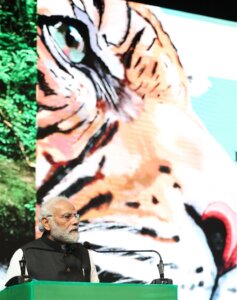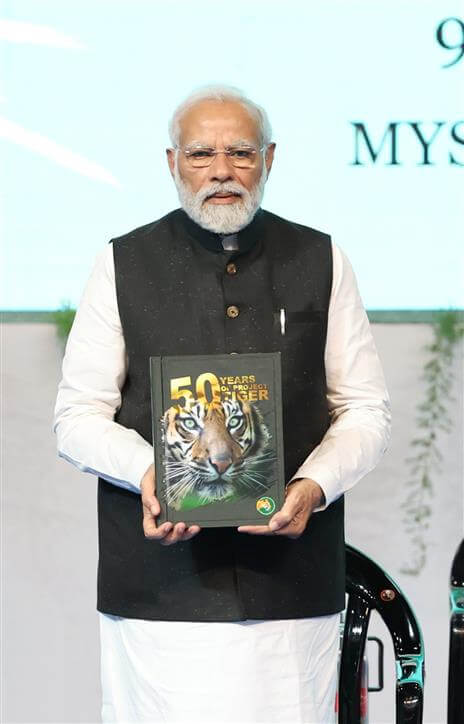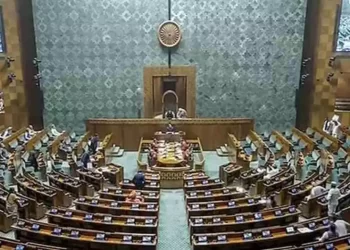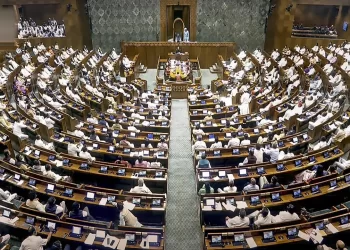The Prime Minister, Shri Narendra Modi inaugurated the program ‘Commemoration of 50 years of Project Tiger’at Mysuru University in Mysuru, Karnataka today. The Prime Minister also launched the International Big Cats Alliance (IBCA). He released the publications – ‘Amrit Kaal Ka Vision For Tiger Conservation’, a summary report of the 5th cycle of Management Effectiveness Evaluation of Tiger Reserves, declared tiger numbers and released the summary report of All India Tiger Estimation (5th cycle). He also released a commemorative coin on the completion of 50 years of Project Tiger.

Addressing the gathering, the Prime Minister remarked on the prestigious moment of the growing tiger population in India and paid respects by giving a standing ovation to the tigers. He said that everyone is witness to the landmark event of Project Tiger completing 50 years today and remarked that its success is not only a moment of pride for India but the entire world. The Prime Minister emphasized that India has not only saved the tiger population from declining but also provided an ecosystem where tigers can flourish. The Prime Minister expressed happiness that India is home to 75% of the world’s tiger population in the 75th year of Indian independence. It is also a coincidence, the Prime Minister continued, that the tiger reserves in India cover 75,000 square kilometers of land and in the past ten to twelve years, the tiger population in the country has increased by 75 percent.
Reiterating the question in the minds of wildlife enthusiasts around the world about the increasing tiger population in India when compared to other countries where it is either stagnant or in decline, the Prime Minister said that the answer is hidden among the traditions and culture of India and its natural urge towards biodiversity and environment. “India does not believe in the conflict between ecology and economy, and gives equal importance to the coexistence of both”, the Prime Minister remarked. Recalling the importance of tigers in the history of India, the Prime Minister mentioned that graphical representations of tigers were found on the ten-thousand-year-old rock art in Madhya Pradesh. He also added that the Bharia community from Central India and Worli community from Maharashtra among others worship the tiger whereas many communities in India consider the tiger as a friend and brother. He further added that Maa Durga and Lord Aiyappa ride the tiger.
Noting India’s unique achievements in wildlife conservation, the Prime Minister said, “India is a country where protecting nature is a part of the culture”. He mentioned that India has only 2.4 percent of the world’s land area but it contributes toward 8 percent to known global biodiversity. He stated that India is the largest tiger range country in the world, the largest Asiatic elephant range country in the world with nearly thirty thousand elephants, and also the largest single-horn rhino country with a population of nearly three thousand. He further added that India is the only country in the world to have Asiatic lions and its population has increased from around 525 in 2015 to around 675 in 2020. He also touched upon India’s leopard population and stated that it increased by over 60 percent in 4 years. Referring to the work being done to clean up rivers such as the Ganga, the Prime Minister highlighted that some aquatic species that were once considered to be in danger have shown improvement. He credited the people’s participation and a culture of conservation for these achievements.
“It is important for ecosystems to thrive for the wildlife to thrive”, the Prime Minister remarked as he noted the work done in India. He mentioned that the country added 11 wetlands to its list of Ramsar sites taking the total number of Ramsar Sites to 75. He also noted that India added over 2200 square kilometers of forest and tree cover by 2021 when compared to 2019. In the last decade, the Prime Minister said, the number of Community Reserves increased from 43 to over 100 and the number of National Parks and sanctuaries around which Eco-sensitive Zones were notified increased from 9 to 468, that too in a decade.
Recalling his experience in wildlife conservation as the Chief Minister of Gujarat, the Prime Minister mentioned working for the lion population and emphasized that limiting to one geographical area cannot save a wild animal. He stressed the need to create a relationship of emotion as well as of economy between the local people and the animal. The Prime Minister highlighted starting the Wildlife Mitra program in Gujarat where the incentive of cash reward was offered to monitor activities like hunting. He also mentioned opening a rehabilitation center for the Lions of Gir and recruiting women-beat guards and foresters in the Forest Department in Gir area. He also highlighted the huge ecosystem of tourism and ecotourism that has now been established in Gir.
The Prime Minister reiterated that the success of Project Tiger has many dimensions and it has led to an increase in tourist activity, awareness programs and a reduction in Man-Animal conflicts in Tiger Reserves. “The presence of big cats has made a positive impact on the lives and ecology of the local people everywhere”, Shri Modi added.
Highlighting that the cheetah became extinct in India decades ago, the Prime Minister mentioned the first successful trans-continental translocation of a big cat referring to the cheetahs that have been brought to India from Namibia and South Africa. He recalled that 4 beautiful cheetah cubs have been born in Kuno National Park a few days ago. And said that the cheetah has taken birth on the land of India after becoming extinct about 75 years ago. He stressed the importance of international cooperation for the protection and prosperity of biodiversity.
“Wildlife protection is not a one-country issue but a universal one”, the Prime Minister said, stressing the need for an International Alliance. He informed that in the year 2019, the Prime Minister had called for an alliance against poaching and illegal wildlife trade in Asia on Global Tiger Day, and remarked that the International Big Cat Alliance is an extension of this spirit. Noting its benefits, the Prime Minister said that it will be easy to mobilize financial and technical resources for the entire ecosystem associated with the big cat while easily implementing the conservation and protection agenda that has emerged from the experiences of various countries including India. “The focus of the International big cat alliance will be on the conservation of the world’s 7 major big cats including tiger, lion, leopard, snow leopard, puma, jaguar and cheetah”, the Prime Minister remarked and explained that countries that are home to these cats will be a part of this alliance. He further elaborated that the member countries will be able to share their experiences, help their fellow country more quickly, and lay emphasis on research, training and capacity building. “Together we will save these species from extinction, and create a safe and healthy ecosystem”, Shri Modi remarked.
Highlighting the motto of ‘One Earth, One Family, One Future’ for India’s G20 presidency, the Prime Minister said that it amplifies the message that a better future for humanity is possible only when our environment remains safe and our biodiversity continues to expand. “This responsibility belongs to all of us, it belongs to the whole world”, he reiterated. Mentioning COP26, the Prime Minister stated that India has set big and ambitious goals and expressed confidence in mutual cooperation that can help in achieving every goal of environmental protection.
Directing his address towards foreign guests and dignitaries that graced the occasion, the Prime Minister urged them to take something back from the life and traditions of India’s tribal society. He highlighted regions of Sahyadri and Western Ghats that have been habited by tribals and said that they have engaged in enriching every biodiversity including the tiger for centuries. He emphasized that the tradition of tribal society of the balance of give and take from nature can be adopted here. Concluding the address, the Prime Minister mentioned the Oscar-winning documentary ‘The Elephant Whispers’ and said that it reflects our legacy of the wonderful relationship between Nature and Creature. “The lifestyle of the tribal society also helps a lot in understanding the vision of Mission LiFE i.e. Lifestyle for Environment”, the Prime Minister concluded.
Union Minister for Environment, Forest and Climate Change, Shri Bhupender Yadav and Union Minister of State for Environment, Forest and Climate Change, Shri Ashwini Kumar Choubey were present on the occasion among others.
Background
The Prime Minister launched the International Big Cats Alliance (IBCA). In July 2019, the Prime Minister called for an Alliance of Global Leaders to obliterate demand and firmly curb poaching and illegal wildlife trade in Asia. Taking the message of the Prime Minister forward, the International Big Cats Alliance is being launched which will focus on the protection and conservation of seven major big cats of the world, viz. Tiger, Lion, Leopard, Snow Leopard, Puma, Jaguar and Cheetah, with a membership of the range of countries harbouring these species.
Source:PIB







 Finance
Finance







